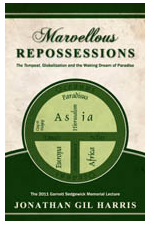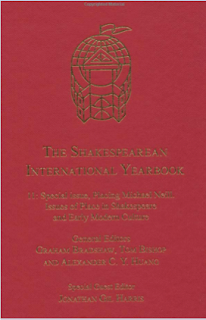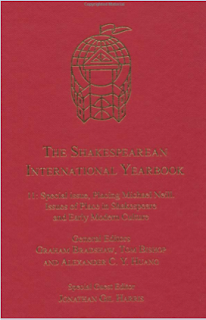A Busy Year–What Else?–for Prof. Gil Harris
 |
| Prof. Harris’s book collects his Sedgewick Memorial Lecture from 2011. |
Prof. Gil Harris has been on sabbatical this year, writing and doing research in India. But that doesn’t mean he has taken a hiatus in publishing. His newly released “Marvellous Repossessions: The Tempest, Globalization, and the Waking Dream of Paradise” is based on the Sedgewick Memorial Lecture at the University of British Columbia he delivered last year; it’s a slender volume published by Ronsdale Press, an independent publisher in Vancouver.
Here how the Press describes the book:
“The book exfoliates The Tempest‘s sustaining fantasy of marvellous repossession, by means of which a lost, phantasmatic wholeness can be reclaimed as a glorious future to come. This is a local instance of one of the West’s most powerful understandings of desire, which, from Plato to Lacan, has been understood as a corollary of a lost originary plenitude. It also informs a particularly Christological conception of history, according to which Paradise is Lost with the promise that it will be one day Regained. This conception gained extra momentum in the wake of Columbus’s “discovery” of the Americas, which was fueled in part by his wish to rediscover the lost earthly Paradise of the Orient. The material practices of early modern globalization were subtended by a related kernel of fantasy: the hope that Paradise might be regained through commerce and colonization of the New World and Asia. “Marvellous Repossessions” resituates The Tempest in this context. All the characters in the play — upper-class and lower-class, European and non-European — are in thrall to a dream of marvellous repossession, of reclaiming a lost whole (Prospero his dukedom, Ariel his liberty, Alonzo his son, Gonzalo a classical Golden Age, Caliban his island). The dream is so pervasive and deep-seated that even anti-colonial attempts to rewrite the play, from Aime
Cesaire and Ndabingini Sithole to Edward Kamau Brathwaite and Lemi Ponifasio, have reinscribed a version of it: the essence of a pre-colonial past can be reclaimed as the blueprint for a liberating post-colonial future. As politically important and necessary as these rewritings have been, however, how much can they really read against the grain of The Tempest‘s imperialist politics when they share its dream of marvellous repossession?”
 |
| The latest issue of Shakespeare International Quarterly, guest edited by Gil Harris |
He has also published and/or has forthcoming a couple of other books, both edited collections. The first is a special issue of Shakespeare International Yearbook (general editors: Tom Bishop, Graham Bradshaw, and GW’s own Alexa Alice Joubin) called “Placing Michael Neill: Issues of Place in Shakespeare and Early Modern Culture), published by Ashgate Press in November 2011. This collection comprises essays by 10 pre-eminent Shakespeareans (including Jean Howard, Marina Warner, Jean E. Howard, Macdonald P. Jackson, David Schalkwyk, and others) that critically engage the work
of Michael Neill, New Zealand’s best scholar of Shakespeare and postcolonial studies: in particular, the volume worries at the theoretical dimensions of “place” — an abiding critical preoccupation
of Neill’s — in relation to processes of globalization. You can read Gil’s introduction to the issue on the publisher’s website.
Indography: Writing the ‘Indian’ in Early Modern England, which Gil edited and contributed to, is forthcoming from Palgrave Macmillan in May. It’s the first book to bring together essays by scholars in two fields previously separated from each other — early American studies and early modern South Asian studies — in order to think about the global discourses of the “Indian” that emerged in England in the two centuries after Columbus’s “mistake.” In the process, the volume teases out affinities and
discontinuities between South Asian, Indonesian, American and even African “Indians” as understood in early modern writing, treating these various discourses as symptoms of a globalization that is still unfolding.
And yes, there is more … a guest-edited special issue of Shakespeare Quarterly called “Surviving Hamlet,” which kicks off with a polemical essay about Hamlet and queer education by queer theorist Lee Edelman.







